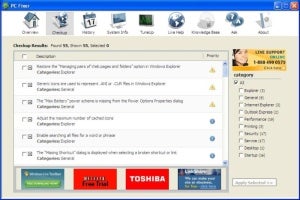The DNA of any Windows PC is the configuration database known as the Registry. Registry settings determine how the operating system (as well as installed software) looks and acts. When something about the system isn’t quite right, you’ll find the problem – and its solution – in the Registry.
Digital Support Technology’s (DST) PC Fixer aims to fix computer maladies through Registry manipulation. In a nutshell, the free XP/Vista-compatible utility performs a Registry scan to identify potential problems and then suggests corrective changes. While we found PC Fixer useful in some situations, some of its suggestions didn’t necessarily make good sense.
You can download PC Fixer for free here (we tested version 2.6.2). “Free” is almost always another term for advertising-supported, and sure enough upon using the utilities Checkup feature to scan your system, you’re presented with a number of small ads embedded within the software.
That said, PC Fixer’s ads are fairly unobtrusive (free programs can often beat you over the head with ads) and at least at the time we tested they were from well-known firms like Microsoft, Netflix and Toshiba.
 PC Fixer scans your PC for problems and displays suggested actions in the Checkup results screen. (Click for larger image). |
We ran PC Fixer’s checkup on three different systems running Windows XP Home, Professional and Vista Business. Depending on the system, PC Fixer flagged anywhere from 19 to 76 potential issues concerning either the Windows operating system or components, Web browsers (both Internet Explorer and Firefox), or Microsoft Office software.
For situations when the scan returns an excessively long list of results, PC Fixer makes it a bit easier to digest by letting you display only the specific categories that interest you (for example, Explorer, Services, Startup, etc.) It also labels each entry with either a blue, yellow or red icon that translates into a low, medium or high priority.
According to the company, PC Fixer makes its recommendations based on scouring various Web-based technical support information sources, including Microsoft’s Knowledge base. (The software automatically checks for updates each time you run it.)
If it Ain’t Broke…
On one of our XP systems, PC Fixer adroitly managed to identify and correct a problem with malfunctioning audio (no sound in spite of the fact that the sound hardware drivers were by all indications installed correctly). We found many of PC Fixer’s other suggested modifications helpful, but in general you wouldn’t necessarily want to allow PC Fixer to make all of its suggested “fixes”, as a few could conceivably be inadvisable.
For example, on one system PC Fixer suggested turning off Outlook Express’s automatic blocking of external content (like links and images embedded in e-mail). This is a security and spam-control feature that should only be turned off for trusted senders, and allowing PC Fixer to make its desired modification would have automatically allowed external content through on all e-mails regardless of sender.
Similarly, on our Vista system, PC Fixer recommended suggested that we turn off User Access Control (UAC), another security which forces confirmation before certain important system settings can be changed. While UAC can be annoying and may not be of much help to people that aren’t especially conscientious about what they click on, turning it off can leave you exposed.
Fortunately, PC Fixer logs the Registry changes it makes, and they can be undone if necessary. In a few instances, PC Fixer suggested a fix for a problem that didn’t really exist. On an XP system, for example, the software reported that the Empty Recycle Bin sound wasn’t working, though it in fact was.
